By Aisha Jumaan, President, YRRF
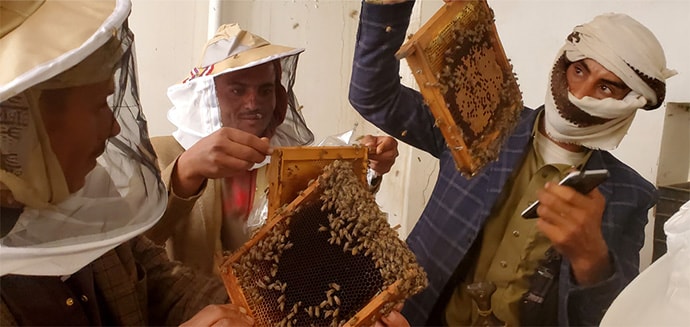
Beehive training and distribution. Photo: YRRF
Now in its ninth year of conflict, Yemen remains the largest humanitarian crisis globally, with 24 million people out of the population of 30.5 million in need of humanitarian assistance. The conflict has left 4 million people, including 2 million children, internally displaced, and at least 500,000 public sector workers have been without salaries for over six years.
After intense fighting at the beginning of 2022, a UN-brokered truce between April and October offered a glimpse of hope; civilian casualties and displacement decreased, fuel imports were received through Hodeida port, and limited commercial flights only to Jordan began out of Sanaa. However, the humanitarian crisis has continued due to the severe depreciation of the Yemeni rial, cuts to international programs assisting Yemen, and instability in international supply chains stemming from the crisis in Ukraine. The war has also exacerbated food prices for a country that imports more than three-quarters of its food needs.
Yemen Relief and Reconstruction Foundation (YRRF) implemented various programs to address poverty in Yemen during these severe times Yemen. These included distribution of food baskets, income generation projects, education and vocational training, health and water.
Food Baskets
YRRF provided food baskets to families in need, reaching places that are often inaccessible to international agencies either due to security concerns or difficult geography. Each food basket supports an average Yemeni family of six for one month. The contents are 25 kilograms of flour, 10 kilograms of rice, 5 kilograms of sugar, 12 cans of beans, and four liters of oil, and during Ramadan, we add two kilograms of dates and two kilograms of milk. During 2022, YRRF reached 35,798 families benefiting 250,523 individuals across 14 governorates and 45 districts. It also supports local charitable bakeries and kitchens. It is important to note that 97% of our food basket distribution costs are spent on food, and only 3% on logistics including delivery. During major holidays such as Feast of the Sacrifice, YRRF distributed two or more kilograms of meat per family, reaching over 48,000 people.
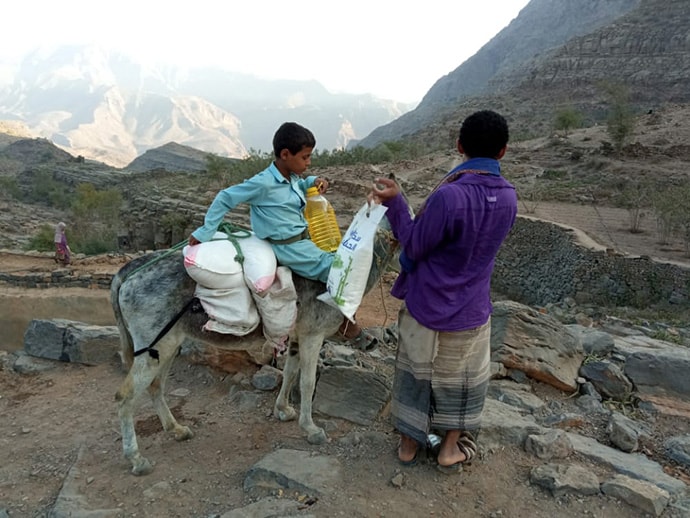
Food basket distribution. Photo: YRRF
Income Generation
YRRF has multiple projects to enable poor and vulnerable families in Yemen to generate income in a sustainable way to improve their food security, self-reliance, and dignity in a time of severe deprivation. In 2022, YRRF provided 1700 families with sheep/goats, egg-laying hens, and beehives. Each family received 3 sheep/goats, or 3 beehives or 10 hens and a rooster; about 2/3 of the beneficiaries were women. In January 2022, YRRF also distributed 35 sewing machines and conducted sewing training. In June 2022, YRRF provided a training course for 1,500 women and girls in Tarim, Hadhramout. This 45-day training course provided instruction in nursing and first aid, handicraft production, sewing, and hairdressing. This project employed older women to train younger ones, this allowed for intergenerational transfer of skills and provided older women an employment opportunity. It also maintained the traditional handicraft of making baskets.
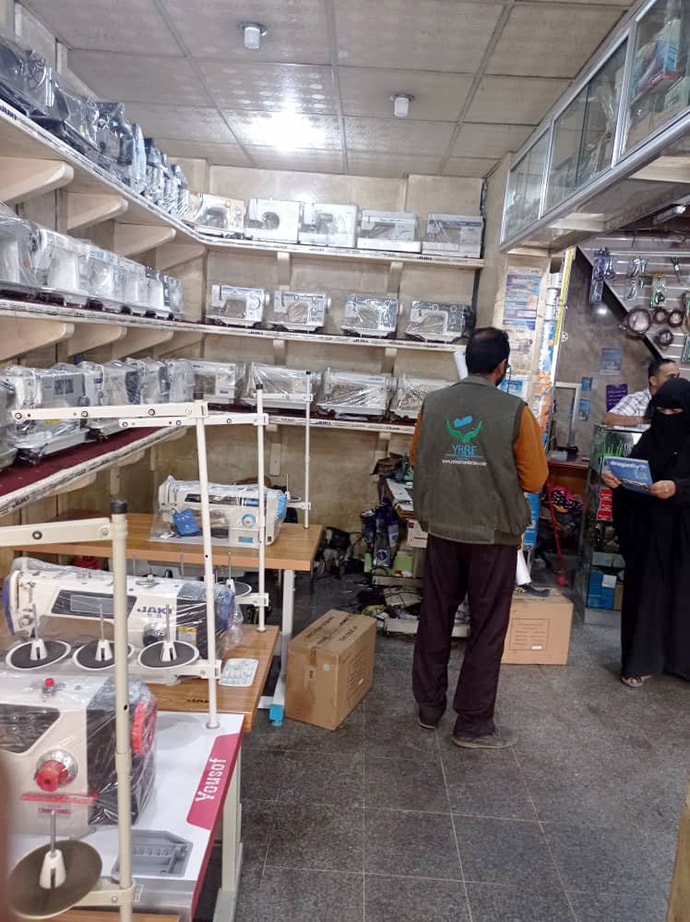
Sewing machine training and distribution. Photo: YRRF
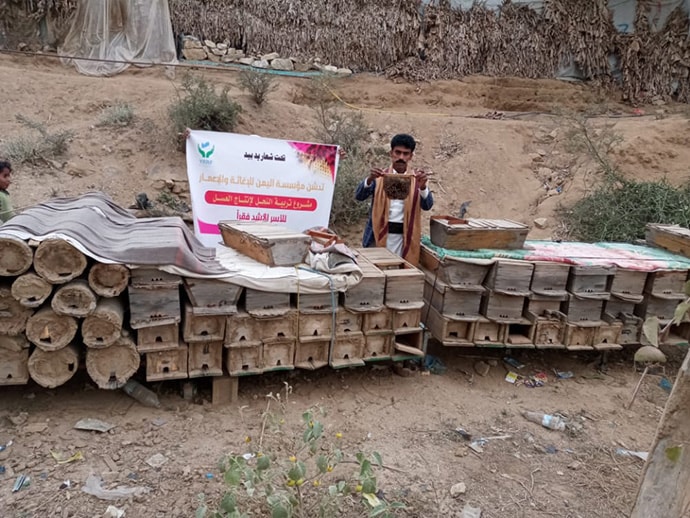
Beehive distribution. Photo: YRRF
Vocational training and Education
Education and poverty are inextricably linked. YRRF focusses on children and women who are the most vulnerable. YRRF has been supporting midwifery training for 20 girls from three governorates currently lacking midwives; these women have now completed two years of a three-year midwifery diploma. YRRF pays their tuition and a monthly stipend to facilitate their ability to attend the training. Once they graduate, they will provide valuable services for their communities and have jobs, since the Ministry of Health and Population offer employment for them after graduation.
Additionally, YRRF supported 60 children living in orphanages between the ages of 14-18 with vocational training and capacity building courses in computer literacy, cell phones repair, solar panels maintenance, and other topics of their choosing. The training was conducted at internationally accredited centers and ranged from 4-6 months. We suspect that these children who have to leave the orphanage at age 19 may not have the ability to attend university, and this training provides them with a vocation that they can use to support themselves.
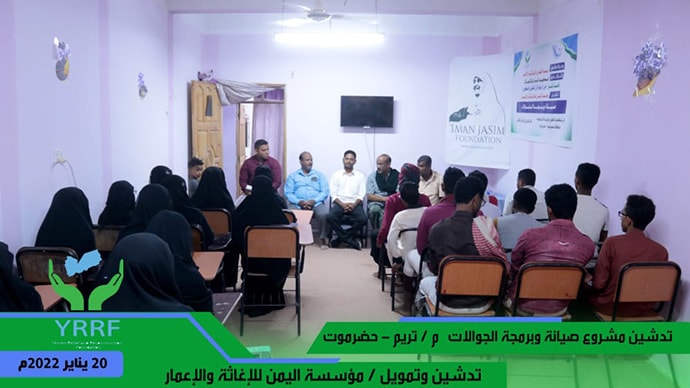
Cell phone repairs training to benefit orphans. Photo: YRRF
Since education is an important factor in gaining future employment, YRRF continued to ensure that school children can go back to school. In 2022, it provided 5,860 children with school bags holding school supplies and textbooks.
Financial support for Orphans
Poverty is a leading cause of orphans’ crisis, worldwide. The ongoing war has left more than 1 million children without proper support. In fact, 1.2 million children have been reported in 2019 as orphans in Yemen—of which less than 5% have been sponsored. The YRRF’s Orphans Project provides sustained support for over 900 orphans less than 18 years of age, across Yemen. This allows families to access minimum basic needs, such as food, shelter, education for the children, and healthcare. Without this support, these families would be struggling to feed their members as many have lost their sole provider.
Health and Water
Ill health is a major cause of poverty. Yemen’s medical system, already fragile before the onset of the war, is under immense strain. Only about 50% of health services in Yemen are operational. Furthermore, import restrictions and the economic crisis have made medicine extremely expensive and inaccessible. In 2022, YRRF provided the Thora Hospital, the largest in Yemen, Emergency Department an ultrasound machine after their only machine broke. It is estimated that this machine serves hundreds of patients each day. YRRF also provided 18 handheld ultrasound probes to hospitals and supported 11 hospitals across Yemen with 818 boxes of medicine and medical equipment. Finally, ensuring access to clean water to prevent waterborne diseases, YRRF provided clean water to over 5,000 internally displaced people per day.
***********
The Yemen Relief and Reconstruction Foundation’s aims to increase awareness of the US public and policymakers vis-a-vis the humanitarian crises underway in Yemen, and support relief and reconstruction, while facilitating peace campaigns. YRRF has been a GlobalWA member since 2019. More information can be found at: yemenfoundation.org